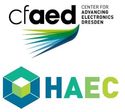3.3 Optimization Techniques for MPSoCs
Date: Tuesday 20 March 2018
Time: 14:30 - 16:00
Location / Room: Konf. 1
Chair:
Stefan Wildermann, FAU Erlangen-Nuremberg, DE
Co-Chair:
Michael Glass, Ulm University, DE
This session presents innovative techniques for optimizing several aspects in multi-processor/core system design. The first paper proposes an effective and efficient design space exploration technique for designing domain-specific platforms. The second paper proposes a novel task allocation and scheduling scheme to maximize soft-error reliability while satisfying lifetime reliability constraints for soft-real-time MPSoCs. Third paper proposes a virtual resource manager that monitors the access behavior and predicts the node-to-node interconnect performance.
| Time | Label | Presentation Title Authors |
|---|---|---|
| 14:30 | 3.3.1 | DS-DSE: DOMAIN-SPECIFIC DESIGN SPACE EXPLORATION FOR STREAMING APPLICATIONS Speaker: Jinghan Zhang, Northeastern University, US Authors: Jinghan Zhang, Hamed Tabkhi and Gunar Schirner, Northeastern University, US Abstract Domain-specific computing is promising for high-performance low-power execution of applications with similar functionality. In particular, streaming applications with significant functional and structural similarities can tremendously benefit. However, current Design Space Exploration (DSE) focuses on individual applications in isolation. Hence, much of the domain optimization opportunities are missed. DSE methodologies need to broaden the scope from individual applications in isolation to optimizing across applications within a domain. This paper introduces a novel Domain-Specific DSE (DS-DSE) approach for domain-specific computing with a focus on streaming applications. Key contributions are: (1) a formalized method to extract the functional and structural similarities of domain applications, (2) a novel algorithm for hardware/software partitioning of a domain-specific platform to maximize the throughput across domain applications (under certain constraints) and (3) a methodology to evaluate a domain platform. This paper demonstrates the benefits using 4 domains: OpenVX (vision processing), and 3 synthetic domains (with greater complexity). Our experiments demonstrate a performance improvement (average throughput) of 36.8% for OpenVX and 46.2% for synthetic domains of the DS-DSE generated platform compared to an application-specific platform. Download Paper (PDF; Only available from the DATE venue WiFi) |
| 15:00 | 3.3.2 | VARIATION-AWARE TASK ALLOCATION AND SCHEDULING FOR IMPROVING RELIABILITY OF REAL-TIME MPSOCS Speaker: Junlong Zhou, Nanjing University of Science and Technology, CN Authors: Junlong Zhou1, Tongquan Wei2, Mingsong Chen2, Xiaobo Sharon Hu3, Yue Ma3, Gongxuan Zhang1 and Jianming Yan4 1Nanjing University of Science and Technology, CN; 2East China Normal University, CN; 3University of Notre Dame, US; 4Meituan.com Corporation, CN Abstract Both soft-error reliability (SER) due to transient faults and lifetime reliability (LTR) due to permanent faults are key concerns in real-time MPSoCs. Existing works have investigated related problems, however, most of them only focus on one of the two reliability concerns. A few efforts do consider both types of reliability together, but ignore the impacts of hardware- and application-level variations on reliability, thus are not applicable to state-of-the-art MPSoCs under variations. In this paper, we focus on increasing SER without sacrificing LTR since transient faults occur much more frequently than permanent faults. Specifically, we propose a novel task allocation and scheduling scheme to maximize SER while satisfying a LTR constraint for soft real-time MPSoCs. Considering that SER is the objective while LTR is a constraint in our problem, and LTR is highly related to core temperature profiles, we dedicate to investigating the effects of variations in core soft-error rate, task vulnerability to soft errors, and task execution time on SER. To the best of our knowledge, our work is the first attempt that jointly handles the two reliability issues as well as taking into account the effects of variations on reliability. Experimental results show that our scheme improves the SER by up to 66% as compared to a number of representative existing approaches while meeting the same LTR constraint. Download Paper (PDF; Only available from the DATE venue WiFi) |
| 15:30 | 3.3.3 | TOPOLOGY-AWARE VIRTUAL RESOURCE MANAGEMENT FOR HETEROGENEOUS MULTICORE SYSTEMS Speaker: Jianmin Qian, Shanghai Jiaotong University, CN Authors: Jianmin Qian, Jian Li and Ruhui Ma, Shanghai Jiao Tong University, CN Abstract Virtualization technology consolidates multiple independent workloads on a single physical server with virtual resource management, which can result in a significant utilization improvement and energy saving. However, the management of virtual resource is becoming more and more challenging, due to the lack of accurate performance prediction model for the diverse applications' irregular resource access behaviors as well as the complicated Non-Uniform Memory Access (NUMA) server architecture. These challenges drastically affect the overall consolidation performance. This paper proposes vTRMS, a runtime Topology-aware virtual Resource Management Scheme for heterogeneous NUMA multicore systems. vTRMS can improve application performance based on the comprehensive online monitor of the application resource access behaviors as well as an accurate and platform-independent detected NUMA topology metric. Experiment results show that, compared with state-of-art approach, vTRMS can bring up an average throughput improvement of 28.3% and 36.2% on Intel and AMD NUMA machines respectively, when consolidating 32-VMs. At the same time, vTRMS only incurs a runtime overhead no more than 5%. Download Paper (PDF; Only available from the DATE venue WiFi) |
| 16:00 | IP1-6, 261 | EXACT MULTI-OBJECTIVE DESIGN SPACE EXPLORATION USING ASPMT Speaker: Kai Neubauer, University of Rostock, DE Authors: Kai Neubauer1, Philipp Wanko2, Torsten Schaub2 and Christian Haubelt1 1University of Rostock, DE; 2University of Potsdam, DE Abstract An efficient Design Space Exploration (DSE) is imperative for the design of modern, highly complex embedded systems in order to steer the development towards optimal design points. The early evaluation of design decisions at system-level abstraction layer helps to find promising regions for subsequent development steps in lower abstraction levels by diminishing the complexity of the search problem. In recent works, symbolic techniques, especially Answer Set Programming (ASP) modulo Theories (ASPmT), have been shown to find feasible solutions of highly complex system-level synthesis problems with non-linear constraints very efficiently. In this paper, we present a novel approach to a holistic system-level DSE based on ASPmT. To this end, we include additional background theories that concurrently guarantee compliance with hard constraints and perform the simultaneous optimization of several design objectives. We implement and compare our approach with a state-of-the-art preference handling framework for ASP. Experimental results indicate that our proposed method produces better solutions with respect to both diversity and convergence to the true Pareto front. Download Paper (PDF; Only available from the DATE venue WiFi) |
| 16:00 | End of session Coffee Break in Exhibition Area
On all conference days (Tuesday to Thursday), coffee and tea will be served during the coffee breaks at the below-mentioned times in the exhibition area (Terrace Level of the ICCD). Lunch Breaks (Großer Saal + Saal 1)On all conference days (Tuesday to Thursday), a seated lunch (lunch buffet) will be offered in the rooms "Großer Saal" and "Saal 1" (Saal Level of the ICCD) to fully registered conference delegates only. There will be badge control at the entrance to the lunch break area. Tuesday, March 20, 2018
Wednesday, March 21, 2018
Thursday, March 22, 2018
|











